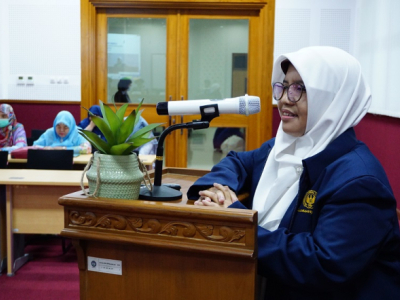Niteni, Niroake, Nambahi (Tri-N) Learning Model Development for Early Childhood Character

Early Childhood Education (ECE) is a coaching effort intended at children aged birth to six years old, with the goal of stimulating components of religious and moral values, cognitive, language, motoric, social emotional, and ert. Because early childhood is a time of emotional, social, and spiritual growth and development, the Strengthening Character Education program outlined in Presidential Regulation No. 78/2017 must be implemented in children from an early age. Character development in early life can help children learn how to regulate their emotions and interact with others. Character is closely related to aspects of behavior, attitudes, ways and qualities of a person that distinguish one person from another, said Nur Hayati, M.Pd, an Education Science doctoral student in the Dissertation Open Examination held offline at the UNY Graduate School.
One of the educational concepts developed by Ki Hajar Dewantara is the concept of Niteni (Observe), Niroake (Imitate), Nambahi (Develop) or Tri-N whose implementation can be interesting for students, so that children can pay close attention to the material, then imitate what the teacher explains and encourage children to develop learning activities that children have done. The Niteni, Niroake, Nambahi learning model to develop early childhood character is supported by Bandura's social cognitive theory and Constructivist theory. Character development is facilitated in this study by the Niteni, Niroake, Nambahi learning model, which is aligned with Bandura's social learning idea and constructivist learning. This development research pertains to Borg and Gall's R&D model, which consists of ten stages.
Nur Hayati presented the findings of the Tri-N learning model research to the Promoters, Co-Promoters, and Examiners in order to develop the character traits of honesty, compassion, loyalty, trust, respect, and responsibility. Then the Learning Model includes syntax, social systems, reaction principles, support systems and learning impacts. This research resulted in the development of the Niteni, Niroake, Nambahii (Tri-N) learning model to develop effective early childhood character.
The empirical test results prove that the Tri-N learning model developed meets the criteria of feasible, effective, and practical. In addition, the Tri-N model learning is proven to be able to encourage children to remind each other of the goodness that was not previously done by children. "Tri-N learning model products in the form of storybooks are also unique with a spiral A3 size that makes it easier for teachers to tell in class." Nur Hayati concluded. (Writer:: Anton, Editor : Dedy, Translator : Dewi)

